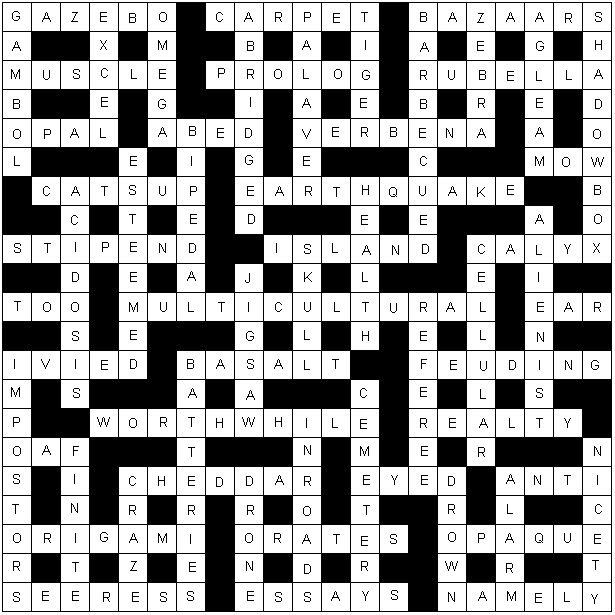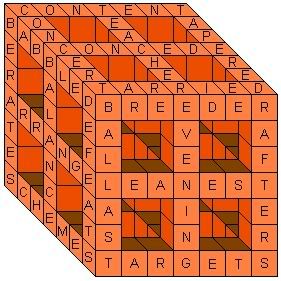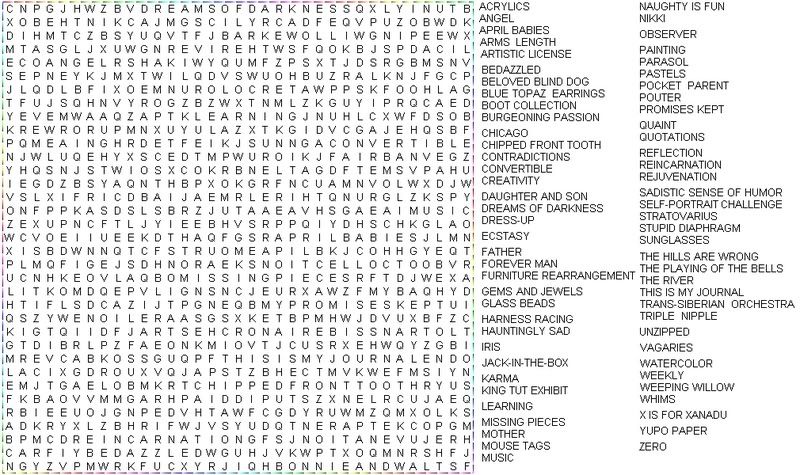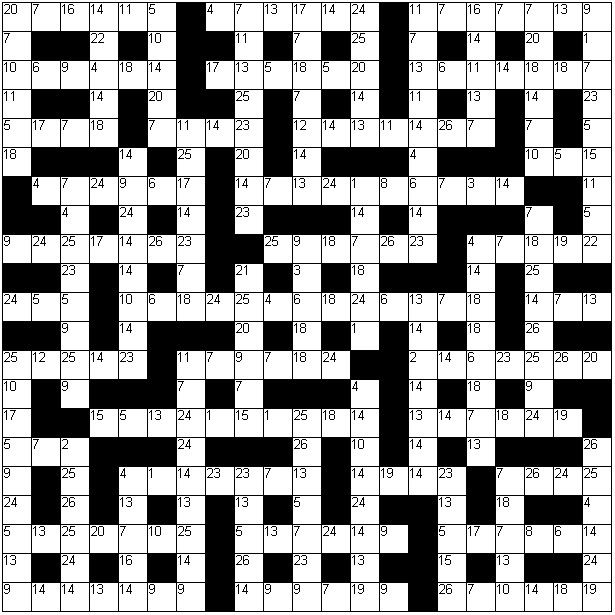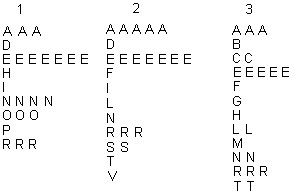This semi-stream of consciousness entry may never see the light of day, but just in case ...
There are festive, colorful drifts of paper everywhere (one of the facts of life at the unexceptional bookbindery was the sheer amount of paper that the print room used as text dividers, and we employees were the grateful recipients of the excess, supposedly non-reusable sheets, shrinkwrapping them into 8 inch tall bundles and toting them home, storing them against the day when we might find a use for them) covered with the expired remains of formerly pristine puzzle grids. Such is our life now, and if we dared take a moment to muse upon where our life has led us, we might suffer serious mental damage, so it is probably best that we do not. However ...
We have begun a new series of crossword-style puzzles that require (requires? Is series singular or plural?) the solver to deduce the letters that belong in the spaces from the numbers provided (when we actually publish one of our WordFigures, we’ll provide more explicit directions.) The charter member of our puzzle club, Debra, upon setting in to solve the first one, inquired as to whether there was a theme. Alas, there is not, as we told her; it is difficult enough matching words that intersect across and down without worrying about a theme. Her query did, however, challenge us and lead us to attempt to construct a thematic puzzle, an effort that was quickly doomed to failure as we began to try to fit the entries on our word list together. We ultimately constructed one, albeit lacking any hint of a theme; these puzzles are more suited to insertion of words that closely resemble each other, and that is the way we have chosen to go. Still, we had that word list, which seemed eminently suited to a Word Search, so ...
So now we get to the point. I can’t remember now what led us to research this particular topic, but the word list for the nascent puzzle consists of a wildly disparate collection of toys, games and puzzles, items that have for thousands of years been devised simply to challenge the mind at such times as there existed leisure for those pursuits. Many of the entries are games that we remember from childhood, classics if you will, and others are those that attracted our interest as we entered adulthood. The younger members of our visitorship (hah! coined another word!) may be unfamiliar with some of the titles, and will likely notice the lack of games familiar to their childhoods, but we had to stop somewhere. (The point is coming along; please wait for it.)
We webcrawled to amazon.com to take a trip down Memory Lane; we felt certain that many of the games that we half-remembered would still be extant, and lo, they are! Some things seem to attain a species of perpetuity that is singularly gratifying. Anyway ...
Among the gaily decorated (gaudy) collections are a number of editions of a particular title that returned us to the years of our seriously misspent youth, back in the days (the early '70s) when we were just beginning to shape our shared history. Bonnie was performing data entry for a financial institution that was eventually consumed by a larger one, and I was working in inventory at Bausch & Lomb. We had acquired a rather odd set of friends who shared our love of gaming, and we would host frequent weekend get-togethers to indulge ourselves.
Among the many games that we enjoyed playing, often while under the influence of malt beverages and herb, was a favorite called Risk (the game of global domination). One of our group, whom we shall call "Dave", had devised what he conceived of as a brilliant strategy for obliterating the rest of us ("Mike", "Todd", "Bonnie", and "Walt".) He would place his little pile of colored wooden cubes on one territory (for some obscure reason, he seemed to prefer Kamchatka) and make only a few forays into other territories whenever he thought he could score an easy victory. He would continue to build his pile of cubes into a truly massive structure, struggling to prevent it from toppling and spilling across the rest of the board.
By the time he had acquired what he considered to be an army sufficient for conquest and domination, we were all pretty far gone, giggling uncontrollably and sometimes laughing uproariously, stuffing our faces with crackers, cheese and grapes, and wondering where all the herb had gone to. At that point, "Dave" would put his scheme into operation, performing a maneuver that he gleefully titled "The Grand Munch", moving his handfuls of cubes hither and yon, marching across the board swiftly and destroying everything in his path. It was a truly impressive spectacle, and the rest of us could only admire his audacity and the greatness of his military mind.
There was, however, one small flaw in his plan ... on each conquered territory, he would leave but a single, lonely cube, apparently deeming it sufficient protection. The rest of his force would continue on the Munch, leaving a string of territories barely defended. Not being idiots (although rendered nearly so by our vast consumption of mind-altering substances) the rest of us would sneak in his back door, so to speak, and parcel out among ourselves all those territories that he had left seriously underdefended. This operation seemed to befuddle "Dave" even more than he already was; it had apparently never occurred to him that we could be so brash and unfeeling as to deny him his victory by such an ungentlemanly (or, in "Bonnie’s" case, unladylike) method of play.
It is difficult to remember now how often The Grand Munch resulted in an actual win, but it seems likely that it was infrequent, as the notion that sticks uppermost in the mind is that of major befuddlement.
Which led us to contemplation of Donald Rumsfeld, our erstwhile Secretary of Defense. It is impossible to know whether that estimable gentleman ever played Risk as a youth, but the execution of the original march on Baghdad, if memory serves, bore a certain resemblance to what we remembered of The Grand Munch, a massive strike force moving rapidly upcountry, sweeping all aside in furtherance of the objective of reaching Baghdad. Little attention was paid to fortifying gains; the main thrust of the plan was always to move men and materiel directly to the capital. The assumption may have been that the citizens were too cowed to offer much in the way of resistance. That, as it turned out, was unwise, as many of the citizens remained armed, and the token forces (if any) that were left to subdue individual towns and villages were insufficient to the need. In hindsight, The Grand Munch may not have been such a good idea. The concept of shock and awe was not enough, even back in the days when we sat around the dining room table playing the game of Risk, to ensure a quick victory.
Thanx for bearing with us for the trip down Memory Lane.
Peace.
Bonnie and Walt
